Enterprise SEO Keyword Tracking: 10 Best Tools & Their Benefits
Enterprise SEO keyword tracking is a critical element for large businesses and businesses operating in multiple locations. In this article we’ll discuss the nuanced world of SEO for large-scale operations, focusing on the importance and impact of tracking enterprise SEO keywords’ rank.
We will highlight innovative tools and techniques that are shaping the way businesses monitor and optimise their keyword strategies, ensuring a robust and effective online presence in a competitive market.
What is keyword rank tracking?
Keyword rank tracking is about knowing where your website pages appear in SERPs for targeted keywords. It’s important to understand how well your SEO efforts are working. Checking regularly how your website is performing for its target keywords helps you know when to adjust your SEO plan to keep your site visible and findable.
This tracking is more than just seeing where you rank. Tools like Google Search Console tell you which keywords your website shows up for, how many people see it and how many people click on it. Other tools can help determine what types of SERP enhancements are available such as a featured snippet. Knowing these factors helps inform your content production process and helps you make better decisions for your SEO strategy.
Why is enterprise SEO keyword tracking important?
Enterprise SEO keyword tracking is vital for understanding and improving any enterprise website’s performance in search results. It plays a critical role in shaping a content strategy at an enterprise level. Here are the top benefits:
![]()
- Performance analysis: Shows how well your website performs for your target keywords. This help you understand where to optimise your existing content.
- Competitive insights: Competitive keyword tracking gives you insights into your competitors’ strategies. It helps you understand what they are doing right or wrong in order to help optimise existing content or make new content to target those keywords.
- Improving poorly performing keywords: Spotting pages that aren’t ranking well for their target keywords can help you improve existing content by looking at what is performing well and replicating it.
- Tracking progress over time: Helps to understand when to optimise existing content or if certain keywords are seasonal.
- Measuring ROI: Tracking keywords helps in measuring the return on investment of your SEO efforts, ensuring you get the most out of your budget.
- Troubleshooting: Spot ranking issues and traffic drops before they become major problems.
- Enhancing traffic, leads, and sales: By making informed decisions, you can improve your website’s traffic, leads, and sales, ultimately benefiting your business.
Key factors affecting enterprise SEO keyword ranking
The ranking of enterprise SEO keywords is dynamic and influenced by various factors. Understanding these factors is crucial for maintaining and improving your search engine rankings.
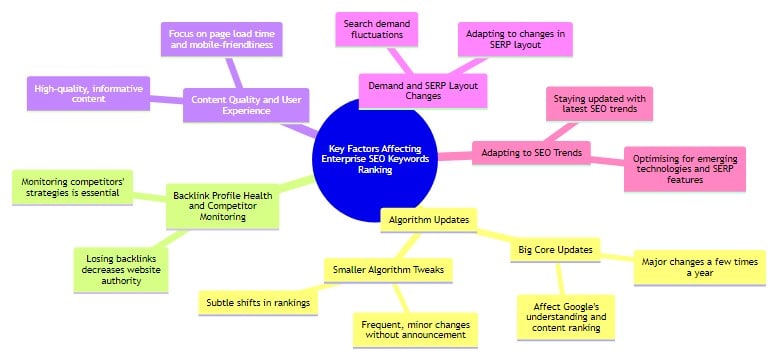
Algorithm updates
Algorithm updates from Google significantly influence SEO rankings. These updates are of two types:
- Core updates: Google brings core updates to its algorithm a few times in a year. These can really shake things up in search results. They change how Google understands what people are looking for and how it decides what content is best. After these updates, you should tweak your SEO approach.
- Smaller algorithm tweaks: Alongside major updates, Google frequently implements minor changes without announcement. These can subtly shift rankings for specific keywords or industries. It’s crucial to stay agile and regularly monitor your website’s performance to adapt to these ongoing adjustments.
Backlink profile health and competitor monitoring
Backlink profile health is one of the major Google ranking signals. Losing backlinks can lead to a decrease in your website’s authority, negatively affecting your rankings. Moreover, building bad backlinks to your domain will degrade your rankings further. Monitoring backlink profiles must be included in enterprise SEO efforts.
On the other hand, an increase in your competitors’ website authority can also impact your position in search results. So, keeping an eye on your competitors’ strategies is essential for maintaining your rankings.
Content quality and user experience
High-quality, informative content is key for SEO. Your content should be detailed, answer user’s questions, and be regularly updated to stay relevant. It also should be well-optimised with target keywords and meta tags. This focus on quality helps improve your search rankings.
A positive user experience is vital for SEO success. Google rewards sites that load quickly and are mobile-friendly. Factors like page load time and interactivity are crucial, and can be measured by core web vitals. By improving these elements, you enhance user satisfaction and strengthen your position in search results.
Demand and SERP layout changes
Search demand can change, influencing your website’s visibility. Trends like seasons or special events have an effect on what people type into the search bar. For example, searches for “Christmas gift ideas” will spike in December. Use tools like Google Trends to help track these shifts so you can adjust your SEO strategy to stay relevant.
Google also changes how search results are displayed often, impacting your site’s click-through rates. New features like featured snippets or more ads can lower where your site is displayed on the SERPs. Staying aware of these layout changes and utilising new features can help maintain your visibility in search results.
Adapting to SEO trends
Staying updated with the latest SEO trends is crucial. This includes adapting to evolving search intents, new search features such as SGE, and enhancing technical SEO for scalability. Emerging technologies like voice and visual search can bring new visitors. Optimising for SERP features like knowledge panels and featured snippets is crucial for maintaining and improving your keyword rankings.
Why is keyword rank tracking difficult for large enterprises?
Enterprise SEO presents unique challenges, especially in keyword rank tracking. Large organisations often have vast and complicated websites, sometimes multiple sites across regions or countries.
Scaling and maintenance of rank tracking
Rank tracking for large enterprises is challenging to scale due to their massive websites, with potentially millions of URLs, each ranking for multiple keywords. Manually tracking such a high volume of keywords is nearly impossible. As a result, most of the rank-tracking tools offer costly packages for enterprises.
Maintaining accurate rank tracking is a significant challenge for large enterprises. Most keyword tracking solutions require a manual selection of keywords to track, which means any new keywords your site starts ranking for will be missed unless they are manually added.
Dealing with data overload and technical limitations
Enterprises face the challenge of sifting through immense data to find actionable insights. This can lead to analysis paralysis, where the sheer volume of information becomes overwhelming. Technical limitations, such as the difficulty of integrating these tools with other platforms, further complicate the situation. Large organisations often need more dedicated SEO resources, leading to fragmented keyword research, tracking, and optimisation efforts.
Gaps in detail and context in enterprise rank tracking
Enterprises face a notable gap in the detail and context provided by standard rank-tracking tools. These organisations need insights beyond basic rank positions, such as performance differences across devices (mobile vs. desktop), regional variations, and trends in keyword performance over time.
However, many rank-tracking solutions offer limited data, focusing mainly on positions without delving into critical details like user engagement or the reasons behind ranking changes. This lack of comprehensive, contextual information hinders enterprises from developing a fully informed and responsive SEO strategy.
How to track keyword rankings for enterprise
Tracking keyword rankings for an enterprise requires strategies that address the scale and global scope of the operation. Here are some effective methods to monitor your website’s rankings across different locations worldwide:
Using private browsing for manual checks
One basic method is to use private browsing, like incognito mode, to search for keywords manually. This approach helps to avoid personalised results based on your browsing history. You can access country-specific Google top-level domains (TLDs) to check regional rankings. For example, use google.co.uk for checking rankings in the UK.

After typing in your keywords, you’ll need to manually count the position of your website in the search results. While this method is straightforward, it’s impractical for enterprises that need to track many keywords due to its time-consuming nature.
Leveraging Google Search Console
Google Search Console (GSC) is essential for enterprises to uncover the search queries users type to find their website and to determine where the site ranks globally. Make sure your website is already set up as a property in GSC. This tool provides valuable insights into user behaviour and the effectiveness of your SEO strategies across different regions.
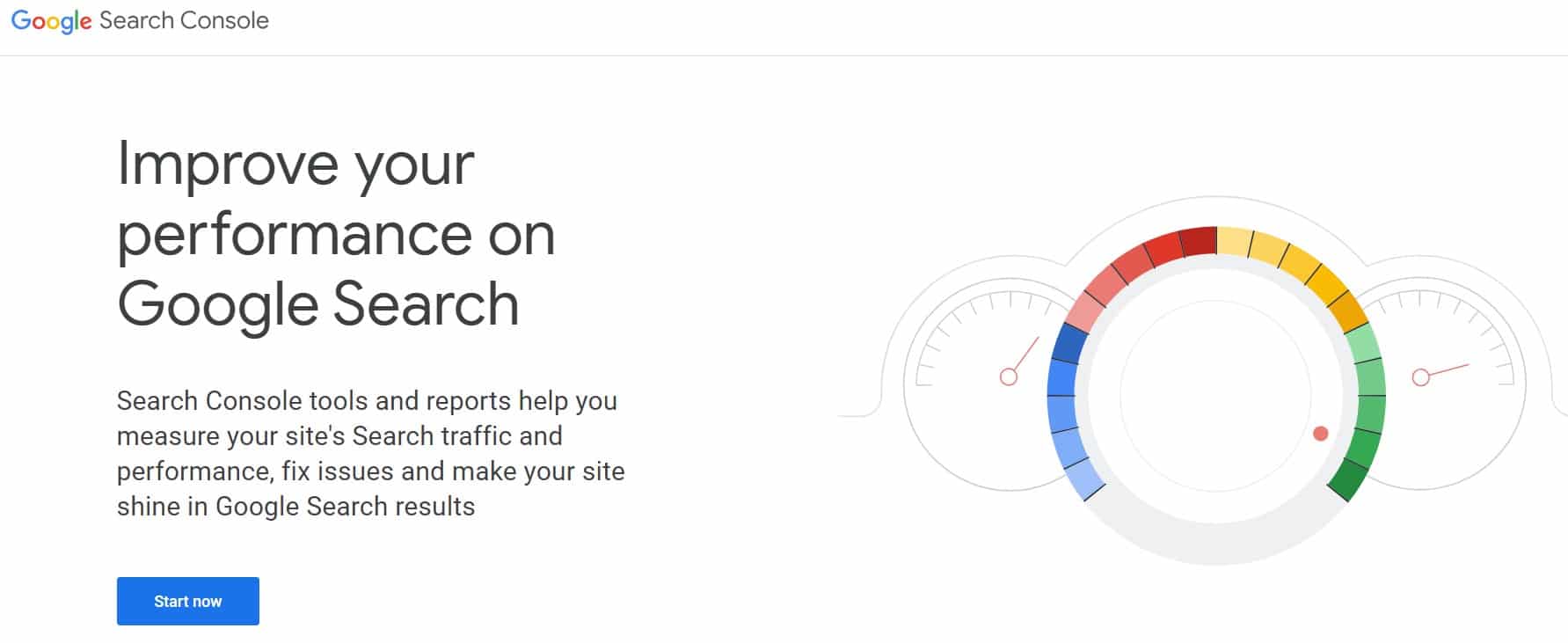
Once logged into your GSC account, navigate to the ‘Search Results‘ section. Here, you can delve into detailed data such as the primary search queries, top-performing pages, and the geographic locations driving the most traffic to your site.
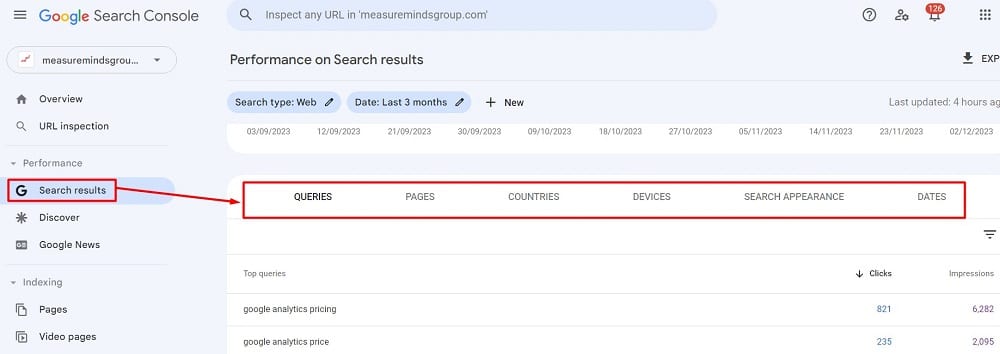
Additionally, GSC provides information about the devices used by your audience, offering a holistic view of how your content is accessed across different platforms.
GSC helps track how many impressions and clicks your keywords get. It also shows the average ranking for all your keywords. This ranking is a key indicator of your site’s visibility.
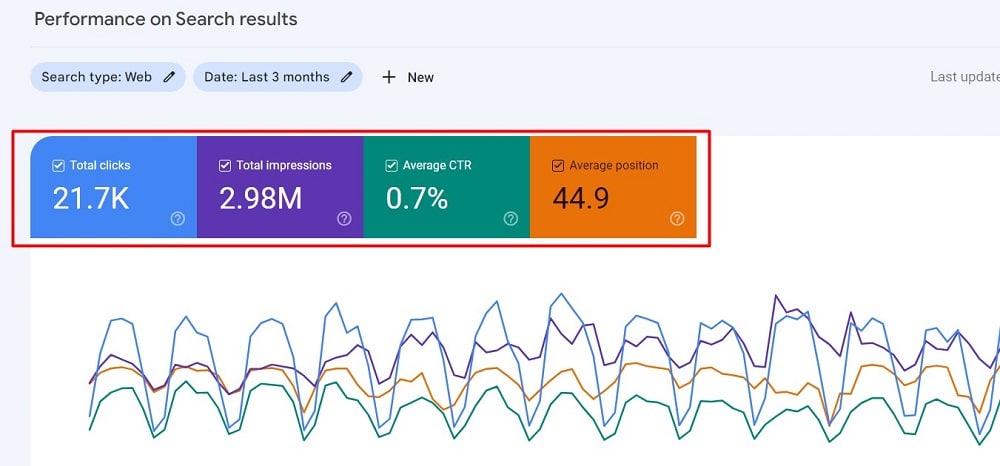
Generally, a higher ranking means more views and clicks. This data is crucial for businesses to refine their SEO strategies globally.
Utilising keyword research tools
Enterprises can turn to specialised keyword research tools for comprehensive and automated keyword tracking. These include the likes of Semrush, Ahrefs, and SE Ranking, which enable automatic tracking of keywords across different locations.
Simply set up a keyword-tracking campaign in your chosen tool. These platforms can send custom notifications about ranking changes, saving time and effort. For a more detailed exploration, we will list out effective keyword rank tracking tools tailored for enterprise needs in the next section.
Expert-recommended enterprise SEO keyword tracking tools
To uncover the most effective tools for enterprise SEO keyword tracking, we’ve gathered insights from ten industry leaders, including founders and CEOs. These experts reveal their top tools, features, usage methods, and pricing strategies to enhance your SEO efforts. These tools will benefit everyone in SEO, from seasoned professionals to novices looking for SEO jobs to break into the field.
Ahrefs: Comprehensive SEO with high cost
I find Ahrefs to be the best all-in-one SEO tool. In our company, we use it for checking competitor backlink profiles, tracking keywords, and conducting keyword research.
Ahrefs offers features such as tracking keyword rankings over time, conducting keyword research, analysing the keywords competitors rank for, comparing your domain to your competitors’, performing site audits, analysing content, and checking competitors’ backlink profiles and linking domains.
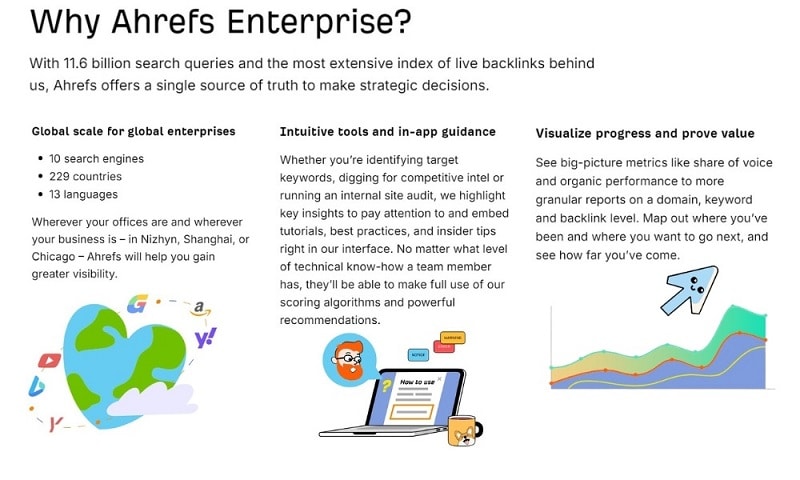
However, Ahrefs’ pricing is a significant drawback. It is quite expensive, especially when compared to its chief competitor, Semrush. The Lite pricing plan starts at $99 and offers a very limited number of features and credits. For a more comprehensive set of features, I recommend the Standard pricing plan at $199, which may be more suitable for small businesses, start-ups, and freelancers, despite the limited number of credits.

Dmytro Sokhach, SEO Expert, CEO and Co-Founder, Editorial Link

AccuRanker: Real-time keyword tracking
AccuRanker is the best SEO keyword tracker we’ve used. It offers real-time keyword tracking, updating rankings daily to keep us informed. The competitor analysis feature allows us to see what our competitors are doing with their keywords.
With SERP features tracking, we can see where we’re appearing in search results, such as in featured snippets or local packs. The integrations with Google Analytics, Search Console, and others provide a comprehensive view. The user-friendly reporting generates sleek, insightful reports that are easy to share with the team. We prioritise monitoring our top-performing keywords and adjust our strategies based on real-time data.
For tracking 1,000 keywords, the pricing is $129 per month, which is quite affordable for the insights and competitive edge it provides in the SEO landscape.
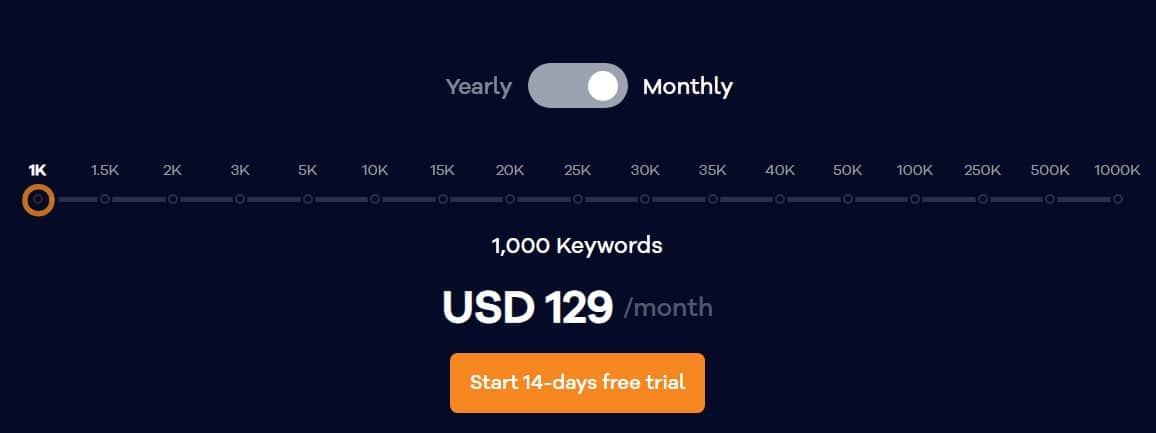
Zephyr Chan, Founder and Growth Marketer, Better Marketer

Dragon Metrics: In-depth keyword analysis
I’ve been working with enterprise SEO for the past few years, and Dragon Metrics has become my go-to tool for keyword tracking. It offers a comprehensive set of features such as deep keyword research and analysis, competitive landscape insights, backlink analysis, and advanced reporting tools.
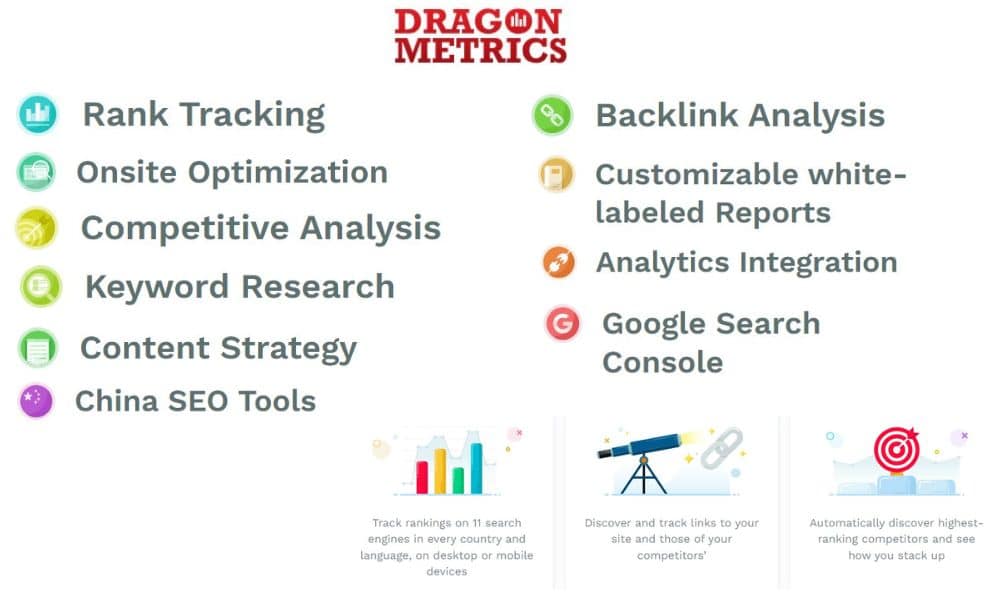
I use Dragon Metrics to conduct in-depth research and analysis on target keywords via a combination of manual checking and automated methods, like tracking API calls or using CSV files with multiple key phrases at once. I also take advantage of its reporting capabilities to get clear insights into my campaign’s performance.
The pricing structure varies depending on the size of your business but generally starts at around $99 per month for small businesses, up to $499 per month/user for larger enterprises with more complex needs (with a maximum of $999).
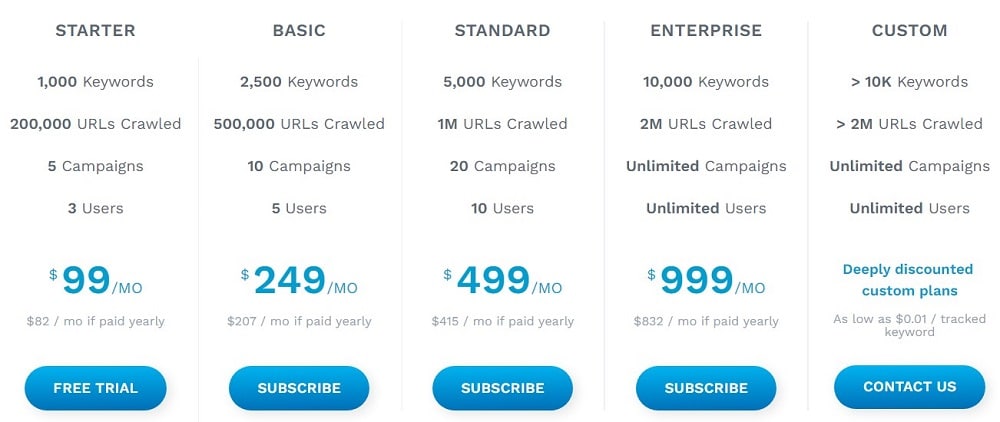
Aslam Rehan, Marketing Assistant, SMS AutoForwarder

SERPWatcher: Daily keyword position monitoring
SERPWatcher by Mangools has been very successful for keyword tracking and ranking. It automatically checks and reports, which smoothens our workflow, and the data provided is quite accurate. The tool is user-friendly but also offers detailed insights into what’s working and what isn’t, including suggestions for improvement.
A particularly useful feature is the “Dominance Index,” which indicates our visibility for the targeted keywords. The interface allows for adding notes to the graph to track events like Google algorithm changes.
I use SERPWatcher by Mangools daily to monitor changes in our keyword positions, monthly search volumes for these words, and the estimated traffic we receive. In my opinion, it’s a tool that every SEO expert should consider. Pricing starts at $29.00 a month.

Alan Redondo, Founder, Ardoz Digital
Agency Analytics: Multi-engine SEO tracking
I rely on Agency Analytics for enterprise SEO tracking. It accurately tracks SEO ranks on various search engines for local, international, and general SEO. It shows key metrics like page authority, domain authority, and backlink data for our competitors on search engine results pages.
I analyse historic keyword positions to assess our SEO strategies, using monthly charts to track progress. Plus, its integration with Majestic software lets me explore client backlink profiles without an extra subscription.

The price of Agency Analytics starts at $12 USD/month/client campaign with a minimum purchase of 5 client campaigns, or you can opt for the agency package at $18 USD/month/client campaign with a minimum purchase of 10 client campaigns.

Mei Ping Mak, Director of SEO and Web, Weave Asia

SEOquake: Extensive keyword analysis tool
When it comes to enterprise SEO keyword tracking, the most effective tool I’ve used is SEOquake. This powerful and reliable software offers a wide range of features that support comprehensive keyword analysis for businesses at any level.
Some of the top features include an extensive SEO metrics report with data like page authority, domain age, and social media data from major platforms. It provides a quick review of SERP performance, a side-by-side comparison between competitors, and simultaneous multiple URL scanning in one go.
I often use SEOquake as part of my daily workflow to recognise how well my website is performing against key competitors and to look up valuable information about potential keywords relevant to my business goals.
In terms of pricing, there’s a free version available with limited options, but there are also more affordable paid versions featuring advanced analytics and other benefits. These range from $19/month to $99/month, according to your specific needs.
Justin Cole, President and SEO Strategist, Tested Media

AIOSEO: WordPress SEO tracking plugin
All in One SEO (AIOSEO) is my go-to for enterprise-level SEO keyword tracking, especially on WordPress. It’s a really complete SEO tool that helps make your WordPress site rank better in searches. It’s packed with great features. You get things like TruSEO for checking your pages, a checklist for SEO audits, unlimited keywords, custom breadcrumbs, smart schema markup, and even WooCommerce SEO.
Recently, AIOSEO added a new add-on called Search Statistics. It lets you keep track of your keywords and see search info right from your WordPress dashboard. The widgets for keyword positions and keyword ranking are super handy. They help set simple SEO goals, like getting a few articles in the top 10, and you can see your progress in reports that are easy to understand.
In the Content Rankings report, it’s easy to see if content is becoming less popular and to spot big trends in how content is doing. It shows when a URL was last updated, how fast our content is getting outdated, SEO details for each URL, and more. AIOSEO starts at $49.60 a year. But for Search Statistics, you need the Elite plan, which costs $299.60 a year.
Precious Abacan, Digital Marketing Manager, Softlist

Serpstat: User-friendly SERP management
Serpstat is a fantastic tool for tracking SERPs in our company, and it’s like an all-in-one solution for enterprise-level SEO. It is used for looking at our website, researching keywords, finding backlinks, and monitoring keywords.
The dashboard is clear, allowing management of settings and execution of various tasks. To track rankings for search terms, one goes to the Rank Tracker section, sets up a new project, inputs website info, chooses search engine settings, and adds the desired keywords.
Serpstat shows how search terms are performing, enables comparison with competitors, organises keywords, and more, all accessible from the dashboard. It offers more visual reports and an easier-to-use interface than other tools we’ve tried. Graphs and charts provide a good overview, with the option of delving deeper into the data.
However, it may not be very beginner-friendly, and some time might be required to learn its use and navigation.
Serpstat’s pricing starts at $55 a month.
Danilo Miranda, Managing Director, Presenteverso

Semrush: Comprehensive keyword research tool
When it comes to enterprise SEO keyword tracking, one of the most effective tools we’ve used is Semrush. Its top features include extensive keyword research capabilities, competitor analysis and site audit functionality.
We use Semrush by first conducting in-depth keyword research to identify the most relevant and high-traffic keywords in our niche. Then, we analyse our competitors to understand their keyword strategies. This helps in refining our content and SEO strategy.
Additionally, the site audit feature is invaluable for identifying and rectifying SEO issues on our website. Regarding pricing, SEMrush offers various plans, starting from $119.95 per month for the Pro plan, which is quite reasonable considering the comprehensive features it provides.
Krishna Rungta, Founder and CEO, guru99

Moz Pro: Targeted keyword research & tracking
The most effective tool I use for enterprise SEO keyword tracking is Moz Pro. Its top features include an extensive keyword database, by providing access to a comprehensive keyword database for thorough research; keyword difficulty analysis, which offers a keyword difficulty score to assess competitiveness; and rank tracking, which allows for daily tracking of keyword rankings, ensuring up-to-date insights.
I use Moz Pro for comprehensive keyword research, identifying and targeting relevant keywords for our enterprise SEO strategy.
Moz Pro offers various pricing tiers. The Standard plan, suitable for small businesses, starts at $99 per month. The Medium plan, which includes more features, is priced at $179 per month. For enterprise-level needs, custom pricing plans are available, offering tailored solutions for larger organisations.
Eric Lam, Founder, Exploding Ideas

Conclusion
Enterprise SEO keyword tracking is indispensable to a successful SEO strategy, especially for large organisations with extensive online footprints. This is because the keywords you target define how people will be able to find you via search engines.
It’s not just about tracking where your keywords rank but understanding the various factors that affect these rankings – from algorithm updates and backlink profiles to content quality and changing user demands.
- A Guide to Integrating GTM Server-Side & Conversions API - 10/07/2024
- How to Backup Universal Analytics Data Easily - 28/06/2024
- Google Analytics vs Snowplow: Should you Switch? - 28/06/2024
